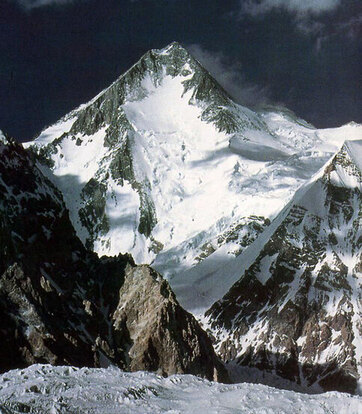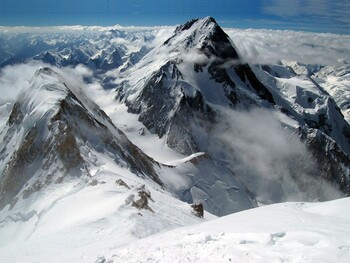Overview
Gasherbrum I Expedition
Gasherbrum I, standing proudly as the 11th-highest peak globally, finds its majestic location in the Gilgit Baltistan region of Pakistan. This colossal mountain is an integral part of the Gasherbrum massive, situated within the Karakoram region of the Himalayas.
The Gasherbrum range, a remote cluster of towering peaks nestled in the Karakoram, occupies a secluded space at the northeast terminus of the expansive 36-mile Baltoro glacier. Among these impressive summits, Mt. Gasherbrum I, often referred to as G-I, stands out as a particularly challenging ascent, known for its demanding nature.
In comparison, its sibling peak, Mt. Gasherbrum II, with an elevation of 8,035 meters (26,362 feet), secures its place as the 13th highest mountain globally. Together, G-I and G-II form a pair of the most remote 8,000-meter peaks in the world.
To embark on the journey to Gasherbrum I's base camp, one sets out from Skardu. This adventure unfolds through the captivating landscapes of the Shigar Valley and the breathtaking Baltoro glacier, culminating in the arrival at G-I's base camp. The climbing season typically spans from the months of June through August, offering mountaineers a window of opportunity to conquer this formidable peak.
Gasherbrum II Expedition
Gasherbrum II (8,034m) is the 13th-highest peak in the world. It is located in the second-highest mountain range in the world which is known as the Karakorum. On 7th July 1956, three Austrians got successful in climbGasherbrum II, standing at an impressive altitude of 8,034 meters, proudly claims the rank of the 13th-highest peak on our planet. Nestled within the renowned Karakorum, the second-highest mountain range globally, this majestic mountain presents a formidable challenge to any adventurer.
On the memorable date of July 7, 1956, a remarkable feat was achieved when a trio of determined Austrians—Hans Willenpart, Josef Larch, and Fritz Moravec—successfully reached the summit of this colossal peak. Gasherbrum II is characterized by its rugged, rocky terrain and icy expanses, making it a formidable ascent that demands not just physical endurance but also a profound mastery of technical mountaineering skills. This peak's unforgiving conditions require only the most skilled and proficient mountaineers to attempt the climb, relying on their technical expertise to conquer the formidable challenges presented by Gasherbrum II.ing this huge mountain. These Austrians included Hans Willenpart, Josef Larch and Fritz Moravec. This peak is too rocky and icy to climb. The proficient mountaineers can climb GII if they will use technical skills.
| DAYS | ITINERARY | SEE LEVEL | RESIDENCE |
|---|---|---|---|
| 01 | Arrive Islamabad, transfer to hotel | 512m | HOTEL |
| 02 | Drive from Islamabad to Chilas via KKH or Babusar Pass | 1265m | HOTEL |
| 03 | Drive to Skardu via Nanga Parbat viewpoint | 2467m | HOTEL |
| 04 | Skardu - official formalities & expedition prep | HOTEL | |
| 05 | Drive from Skardu to Askoli (rough jeep road) | 3000m | CAMPING |
| 06 | Trek from Askoli to Jhula | 3200m | CAMPING |
| 07 | Trek from Jhula to Paju | 3450m | CAMPING |
| 08 | Paju rest & acclimatization day | 3450m | CAMPING |
| 09 | Trek from Paju to Urdukas | 3900m | CAMPING |
| 10 | Trek from Urdukas to Goro II | 4200m | CAMPING |
| 11 | Trek from Goro II to Concordia | 4650m | CAMPING |
| 12 | Trek from Concordia to Gasherbrum Base Camp | 5150m | CAMPING |
| 13/50 | CLIMBING PERIOD: Gasherbrum Summit Push (38 Days) | 8126m max | CAMPING |
Services Included
- Comprehensive airport pickup and drop-off services.
- Round-trip airfare between Islamabad and Skardu.
- Transportation, including briefings, debriefings, and sightseeing.
- Transportation between Skardu, Askoli, Hushe, and Skardu.
- Three nights of accommodation in Islamabad, featuring twin-bed rooms with bed and breakfast provided.
- Three nights of full board accommodation in a Skardu hotel.
- Two nights of full board accommodation in a Chilas hotel.
- Coverage for local staff, encompassing wages, insurance, food, and equipment.
- Support from low porters to transport expedition and trekking equipment, as well as food supplies.
- Allowance for 75 kg of equipment per climbing member on the ascent.
- Allowance for 50 kg of equipment per climbing member on the descent.
- Provision of all trekking and base camp meals.
- Supply of comfortable member tents, mess tents, kitchen tents, storage tents, office tents, shower tents, toilet tents, tables, chairs, and kitchen utensils.
- Assistance with reconfirming international flight tickets.
- Coverage of all camping fees, road taxes, and bridge crossing fees.
- Supply of low porters' equipment.
- Documentation and climbing permit.
- Management fees for CKNP West.
- Royalty fees and additional member fees.
- Kit allowance, food, and flight fare for the liaison officer.
- Availability of an electric generator/solar system at the base camp.
- Heating system at the base camp.
Services Not Included
- International flight tickets for members.
- Helicopter emergency rescue fees (refundable if not used, currently at US$15,000).
- Climbing gear for members.
- Personal insurance for members.
- High-altitude tents.
- High-altitude food.
- High-altitude porters.
- Sleeping bags and personal expenses such as telephone calls, fax, email charges, liquor, soft drinks, room service, gratuities for personal services, and items of a purely personal nature.
- Charges for custom clearing (import and export of equipment).
- EPI gas and oxygen cylinders.
- Any unforeseen expenses, including roadblocks and additional hotel stays if members stay more days at the Base Camp. Extra expenses will be charged according to the number of additional days.
- Trekking members and climbing members will remain together. If any member splits during the trip, extra expenses will be charged at the normal price.


